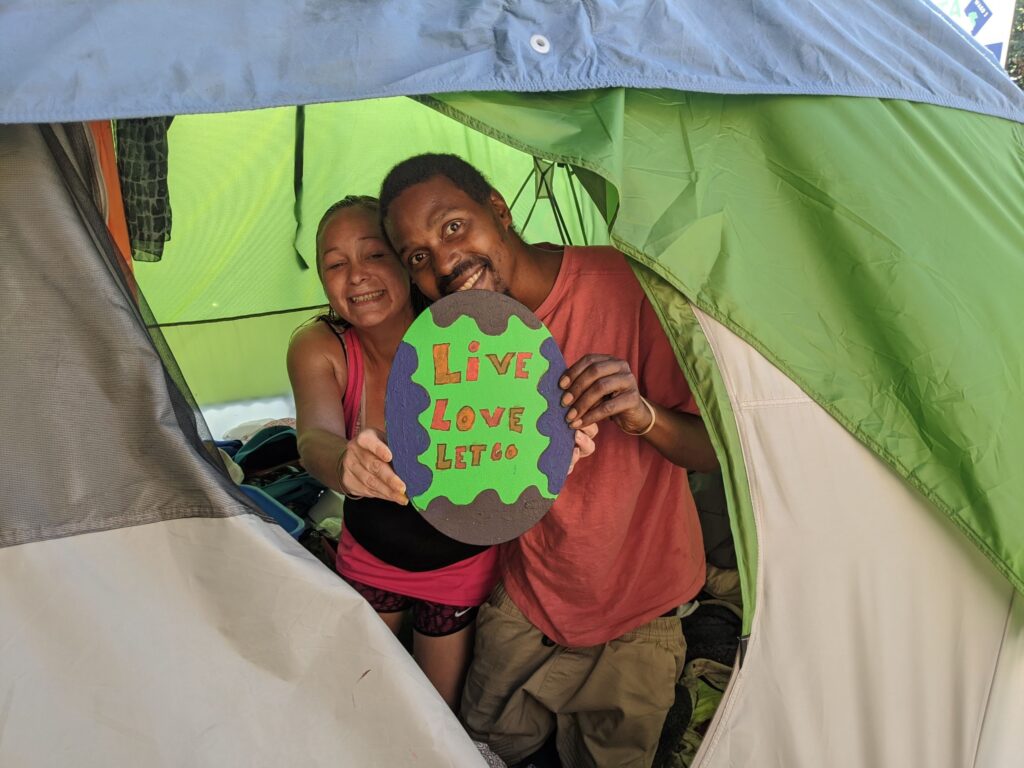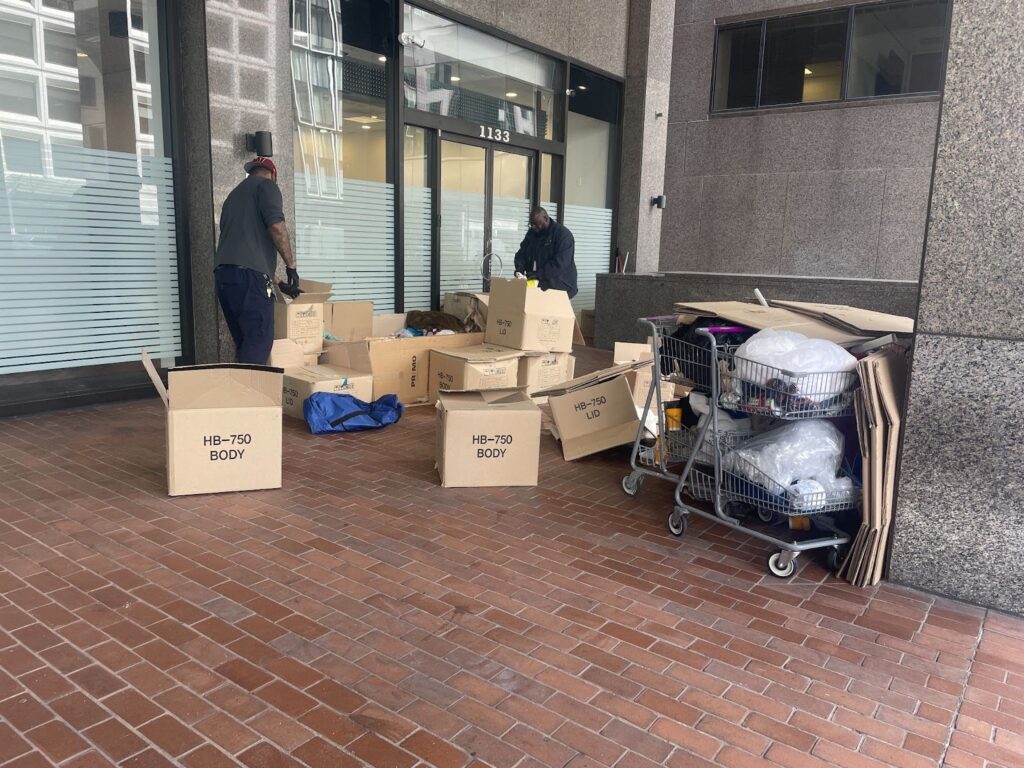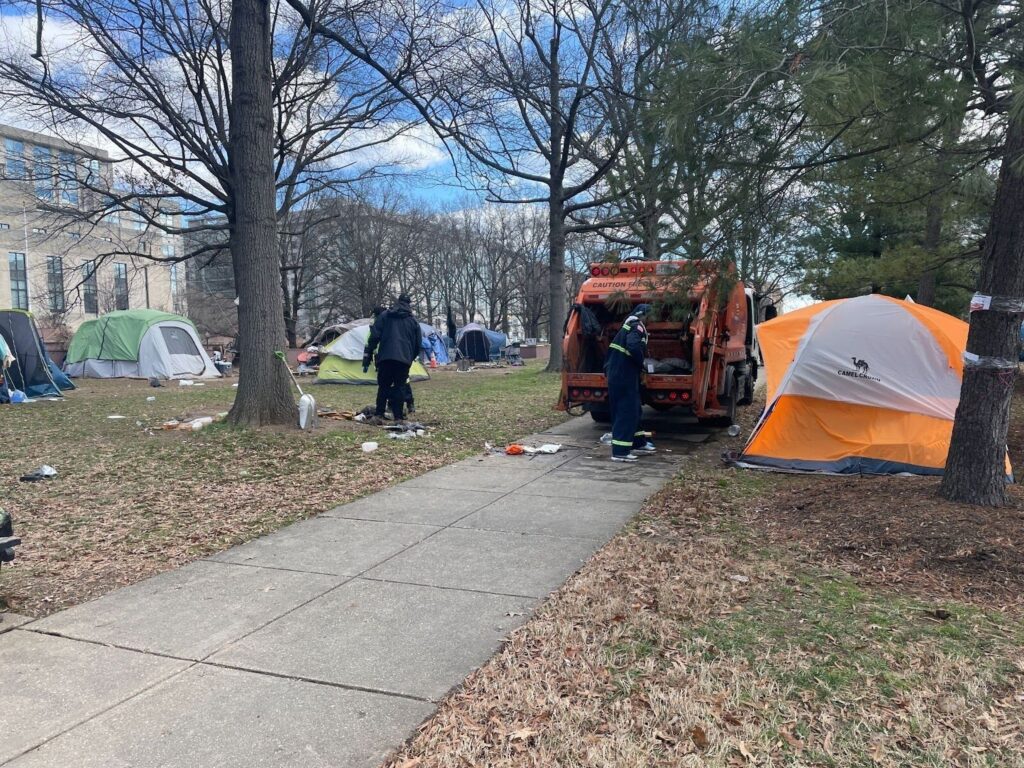Two homeless residents living in front of the Safeway at 17th and Corcoran streets NW lost all their belongings to vigilantes overnight. Stevie and Savon have been living outside in the Dupont Circle area for nearly a year and a half after moving from an underpass on K street NE that had been frequently targeted by city encampment cleanups and was later permanently closed to tents in January. A close friend offered them a shower and room for the night on Saturday, July 25, according to Stevie. They accepted this charitable reprieve from life on the street but returned the next day to find that all of their belongings — including medicine, birth certificates, and their home — had been removed without their knowledge.
According to the police report, Savon and Stevie left their encampment in front of the Safeway at 10 p.m. for a night stay at the nearby Airbnb and all of their belongings were removed between 3 a.m. and 5 a.m. The investigation is ongoing.
“They tricked them,” alleged Dan Casey, a homeless resident and the friend who texted Savon’s brother about their missing belongings.“They had somebody befriend them and offer them a couple of nights in an Airbnb. While they were in the Airbnb, they rolled up with a truck, or somethin’ and took everything.”
Stevie is adamant, however, that the person who rented the Airbnb is trustworthy and not involved.
She told the police she believes the manager of Cairo Wine & Liquor, across Corcoran Street from Safeway, hired a private contractor to remove their belongings. The vice president of Cairo Wine & Liquor denied any involvement of his business in the clearing. The investigation is ongoing and a spokesperson for the Metropolitan Police Department said they could not comment further until the case was closed.
The woman who rented the Airbnb, a housed neighbor, said she rented a weekend stay for Stevie and Savon to take showers and do laundry at the end of June. She asked to remain anonymous to avoid hurting the feelings of other homeless friends she has not helped in the same way. Everything went smoothly in June and she wanted to help them again. She told Street Sense Media no one knew about the rental except for Savon, Stevie, and Savon’s brother, but conceded that word of the Airbnb could have spread. Stevie said it is likely that people in the neighborhood overheard them talking about it or saw them coming and going to access their belongings.

Alonzo, who is unhoused and lives on the other side of 17th Street NW in front of the McDonald’s, told Stevie an employee from the liquor store described the plot to him late Sunday morning. Stevie said the employee told Alonzo that after he overheard from local customers that Stevie and Savon would be staying in an Airbnb that night, he and other Cairo employees plotted to remove their belongings while they were gone.
Stevie said she and Savon were approached by a different employee of Cairo after their belongings were removed, who she later identified as the store’s vice president. She said he called the incident a miscommunication and explained that a private contractor was supposed to clear trash from the side of the store.
When asked about the miscommunication, Mitch Aarons, Cairo’s vice president, told Street Sense Media that a tenant who lived upstairs had moved out and the store requested that the D.C. Department of Public Works remove the tenant’s leftover belongings on Monday morning, which would have been the day after Stevie and Savon’s things were taken. The department provides bulk trash pick-up by appointment.
DPW did not respond to requests for comment. Neither did the Office of the Deputy Mayor for Operations and Infrastructure, which oversees the department.
Stevie said she was shown clips of security footage from the morning their home was cleared and is hoping to see more complete footage from Safeway and McDonald’s. “We may get lucky in being able to zoom in on the tag number since it’s a perfect visual,” Stevie said, referring to the vehicle in the video. She did not share any details about the vehicle’s appearance to avoid any damage to the police investigation.

“I guess the miscommunication was that a private contractor instead took all the belongings next door and another person’s belongings down the street from us, but what kind of miscommunication is that?” Stevie said. “Because that was a huge miscommunication, especially when we walk around the corner and our things are gone, but the trash on the side of Cairo is still there.”
She felt betrayed by the alleged plot described by Alonzo because when looters tried to enter the store during the George Floyd protests, Stevie called the police to ensure that the store didn’t lose its inventory.
“Nobody at Cairo Wine and Liquor had anything to do with the removal of their stuff. I’m not sure why they believe that we had something to do with it,” said Mitch Aaronson, the vice president of Cairo Wine & Liquor. “I tried to speak with them to explain that we had nothing to do with it, but it seemed that their minds were made up. They told me that the police were involved and looking at cameras in the neighborhood.”
Growing neighborhood tensions
The demolition of their home — all their clothes and jewelry, including heirlooms from Stevie’s mother, money kept in a “savings corner,” tarps, blankets, flashlights and chargers, pictures of Stevie’s children, and manuscripts Stevie had been working on — is not the first time the couple has received pushback from neighbors. Nick DelleDonne, president of the Dupont East Civic Action Association and former ANC commissioner of the area, said Dupont Circle neighbors have used the platform Nextdoor to shame a number of homeless members of their community. The company’s “community guidelines” advise against public shaming.
One neighbor, Lawrence Sprowls, posted a list of crimes and run-ins with the police attributed to homeless people in the area, including Stevie and Savon’s personal history. Doing so is also against the Nextdoor guidelines, “unless there is a compelling public interest served by doing so.” The site has been criticized for elevating racial profiling but claims to have reduced such instances by 75% since 2015. Last month, it removed the ability to forward suspicions to local police departments, including MPD.

[Editor’s note: The Nextdoor community guidelines also advise against quoting, screenshotting, or otherwise sharing neighbors’ posts outside of the neighborhood forum. Due to the mostly public nature of the forum, visible by all neighbors in the area, and the relevant sentiments illustrated by this dialogue, we chose to screenshot the post and reached out by email to notify the author and provide the opportunity to comment.]
Stevie said Sprowls took photos of them for several weeks in 2020 and videotaped them from across the street. In March, Washington City Paper reported that Sprowls has called the mayor’s office multiple times to complain about encampments and has even offered Stevie money to leave the neighborhood.
“They’re there because that’s where they can panhandle,” wrote another housed neighbor in an April 24 email obtained by Street Sense Media. “And all options that involve getting them into safe and sane housing means their losing their panhandling grounds. Since the law (during non emergency times) says they have to agree to leave the sidewalk, the only solution is to quit enabling them. Quit making life on that sidewalk easier for them. Most of us understand that if we want to solve the rat problem here we have to cut off their easy access to the food scraps they find in our neighborhood. The rats come here instinctually. The same applies to human beings. We are pre-programmed to instinctively seek out places where our basic needs are met. These individuals’ basic needs are pretty simple… drugs for the most part. They’re not going to leave our sidewalks for safer and saner places until we stop giving them drug money.”
The email was written in response to a message on the HearUsNow! listserv, founded by DelleDonne. The author is not named here because their comments were not posted in a public forum. Other neighbors on the listserv and on Nextdoor have responded to such comments with disappointment and support for people experiencing homelessness in the area.

“We have never done anything to hurt anybody,” Stevie said. “However, people on the Nextdoor app have gone as far as to say that Savon, my other half, has chased women into Safeway and harassed them. They say that I got approached by a woman giving me some personal female products and that I spit on her. Never in my life would I ever show such disrespect like that.”
ABC 7 reported rising tensions surrounding homelessness in the neighborhood as early as 2017, before Savon and Stevie arrived. Neighbors complained about public drug use and public urination and called for more law enforcement in the area.
According to Stevie, she has been banned from using the bathroom at the McDonald’s on 17th Street NW, even when she buys food at the restaurant. There are no public restrooms in the immediate area. As part of Mayor Muriel Bowser’s response to the coronavirus pandemic, nine portable toilets and 32 handwashing stations were deployed in early April near locations where people experiencing homelessness were known to live or frequent. A handwashing station was placed outside of the Safeway on 17th Street, but the closest portable toilet was placed at the Dupont Circle Metro Station, roughly five blocks away.
The city’s response
Local advocates for people experiencing homelessness say they have never seen a similar instance where neighbors have taken clearing encampments into their own hands. Kelvin Lassiter of Save Us Now D.C. worries it could become a popular trend as homelessness is projected to increase by more than 40% due to the health crisis and encampments are already contentious in many of the neighborhoods where they exist.
“These vigilantes have empowered those who feel unhoused citizens are an eyesore in their neighborhood,” Lassiter said. “This is just the beginning of this practice as an enormous amount of evictions proceed across the country.”

The data collection software company Urban Footprint projects that as many as 7 million households nationwide are at risk of eviction if they do not receive government assistance. Since the start of the pandemic, the D.C. Council has passed multiple measures related to rent relief in an attempt to prevent these outcomes.
Stevie and advocates for the larger homeless community argue that continuing city-led encampment clearings during the pandemic are also concerning. The Centers for Disease Control and Prevention released guidance in March that recommended pausing encampment sweeps during the health crisis.
Since then, Ann Marie Staudenmaier, an attorney for the Washington Legal Clinic for the Homeless, has been pushing for the halt of all D.C. encampment sweeps. The CDC recommended that “if individual housing options are not available, allow people who are living unsheltered or in encampments to live where they are.” Moving people during the pandemic, Staudenmaier argues, puts people experiencing homelessness at risk and increases the chances of spreading the virus.
Halted for the first three months of the pandemic, Staudenmaier said the District has “ramped up the number of clearings.” A Street Sense Media vendor witnessed an encampment cleanup at the park at New Jersey Avenue and O Street NW in April where people were forced to move, going against the “trash-only” cleanup policy Staudenmaier was referring to, which was adopted in March to adhere to CDC guidelines. Stevie tweeted in July that a cleanup had occurred, but said the usual two-weeks notice had not been given — that a notice was only posted after their belongings were rifled through by city workers. According to the most recent iteration of the city’s encampment protocol, “immediate disposition notices,” one of which can be seen in Stevie’s tweets, are posted after an area has been cleaned. The city had conducted two cleanups of the area in the weeks before her and Savon’s home was discarded in the middle of the night.
What is this??? Illegal!! pic.twitter.com/qJfHjhC0Po
— Stevie Rae Munch/MaKin_MuNcH_SeNsE (@MunchStevie) July 23, 2020
“What they claim is that they are still following the CDC guidance, but that they are only doing clearings of places where they feel like it’s a hazard safety emergency and have to force people to move,” Staudenmaier said. “We believe that that’s not the real reason. We think that it’s more about neighborhood opposition.”
The Office of the Deputy Mayor for Health and Human Services, which coordinates interagency encampment sweeps carried about by the city, did not respond to questions about encampment sweeps during the pandemic or the July “trash only” cleanup. The department did confirm it was not involved in the overnight cleanup the morning of July 26 and follows a “strict encampment engagement protocol” that involved outreach to residents and official sign postings prior to any cleanup.

In a letter responding to an email from D.C. Council Chair Phil Mendelson, the deputy mayor’s office explained that while some neighbors want the homeless residents to be left alone, the office has had multiple “people reach out to [their] team asking [them] to do more and permanently remove the encampments” in Dupont Circle.
Casey, the man who texted Savon’s brother about the overnight cleanup, said that as the Dupont Circle neighborhood changes, people experiencing homelessness face increasing pushback. He has been homeless there for more than three years. “You’ve had homeless in Dupont for so long, but the city is changing now, and the people coming in don’t want to see it,” Casey said.
The latest D.C. Point in Time count shows that while families experiencing homelessness have decreased by 48%, the number of unsheltered single adults grew slightly. The National Law Center on Homelessness and Poverty also documented a 1,342% increase in encampments nationwide over the past decade.
The average rent for a one-bedroom apartment in Dupont Circle is $2,375, according to the software company RentCafe. The average person needs to make a minimum of $60,000 a year to afford a one-bedroom apartment in D.C., according to a report the National Low-Income Housing Coalition released last month.
“I think much attention needs to be had to what has been done to multiple homeless in this area,” Stevie said.
Police are trying to obtain video footage from the Safeway and McDonald’s on 17th Street NW, according to Staudenmaier. If someone is identified as having removed the belongings maliciously, she said Stevie and Savon could press charges for theft and property destruction. However, Staudenmaier also said that one officer that spoke to the Legal Clinic said there may be no charges if the missing property could have reasonably been considered abandoned.
Stevie and Savon are accepting donations via the Cash App platform: $saistevie33.
Update (10.01.2020)
MPD published this composite of security camera footage of the incident, noting the video shows it occurred at approximately 5:30 a.m. “Crime Solvers of Washington, D.C. currently offers a reward of up to $1,000 to anyone who provides information that leads to the arrest and indictment of the person or persons responsible for a crime committed in the District of Columbia. Your assistance is appreciated by your community. CCN [Central Complaint Number] #20-106-679,” says the post on the department’s YouTube account. “Anyone who can identify these individuals or who has knowledge of this incident should take no action but call police at (202) 727-9099 or text your tip to the Department’s TEXT TIP LINE to 50411.”








